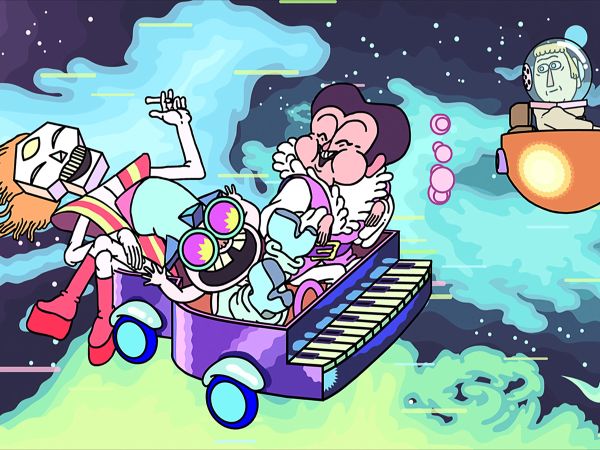
Here is our first interview with a film maker in what we hope to be a regular feature on our blog.
Jeff Simpson, one of the three co-directors of A Liar’s Autobiography, talks about the experience of making the animated feature based on Graham Chapman’s life.
I asked Jeff to explain the genesis of the project. He sprang into a well rehearsed monologue, recounting professional encounters with the Pythons in which he had dropped in the idea of making a documentary about Graham Chapman, the only deceased member. With the help of David Sherlock, Graham’s long-term partner, Jeff tracked down the voice recordings Chapman did of his autobiography.
Jeff talked about his formal training as a BBC Arts documentary maker, so unsurprisingly his first instinct was to approach the great British Broadcasting Corporation for a talking heads documentary. To quote Jeff “In their wisdom they turned it down; they didn’t feel Graham Chapman was interesting enough”. He made it clear he was not bitter, the tone of light sarcasm bubbling underneath, and proceeded to spell out the surname of the BBC executive who rejected the project.
The other two co-directors, Bill Jones and Ben Timlett, seemed to come into play soon after this point. Similarly to Jeff, they had been working with the Pythons recently on a big budget documentary series for U.S. television. Bill (who is the son of Terry Jones) was crucial in gaining them access again to the other Pythons. However Jeff was repetitious in his emphasis that this was a Graham Chapman film, not a Monty Python feature.
Saying that, inspired by Terry Gilliam’s cut-out paper interludes, Bill & Ben had explored animation as a structural device in their documentaries, while Jeff had done the equivalent for his pitch to the BBC. Jeff described a eureka moment which happened after the three of them partnered up. This was where they realized the autobiography was more or less divided into a series of scenes with dialogue. “We realised we could take out Graham’s voice from the other characters and replace them with other members of Monty Python… so effectively you’ve got a new scene. As soon as you say we can get Terry Jones to play the mum, Michael Palin to play the dad then you’ve got it.” As the project developed into an animated feature, the other Pythons were keen to come on board as they all had great respect for Graham as a writer. Palin in particularly used a passage from A Liar’s Autobiography to describe their first visit to America in his one-man show.
In reference to working as one of three directors, Jeff explained, “When I signed up for this I thought it would be a disaster”. As it turns out now Jeff recommends it as a formula; “With two [directors] I can see it would be difficult. There’s no way of brokering a disagreement… It happened on Holy Grail, the plan was that Terry Gilliam and Terry Jones would co direct it but they ended up fighting. One Terry would shoot something in the morning and then the other Terry in the afternoon would re-shoot it differently… With three there’s always a majority vote.” Jeff used to tell his editors at the BBC “ I probably come up with ten new ideas every day, but only two of them are any good and your job is to tell me which two are the good ones.”
The animation was a technically daunting process. Not only had they recruited over a dozen different animation studios but also they took on stereoscopic cinema or 3D with none of the crew having much experience. Luckily for Jeff, Bill and Ben they had Justin Weyers, the animation producer. Jeff humbly proclaimed at the cast and crew screening “…people wonder what the directors actually do on a film. We tell Justin what we want and he makes it happen.” Justin was not only the go between, animation wrangler, director of animation and technical guy, he was also one of the animators, directing the Biggles scene in the fighter plane. Jeff explained it was the directors’ role to concentrate on script and story while also keeping the over view, making sure what was essentially a set of shorts works as a feature film.
Later he went into detail about the process of gaining funding. Crucially Ben Timlett managed to negotiate a final cut with Epix, a US broadcaster who footed half the bill. Initially another channel had rejected the script because it was a bit raunchy while Epix picked up the project for the reason the other studio discarded it.
When I asked how he saw this film fitting into the wider context of animated documentary Jeff retorts “We do see our film as something completely different. It’s interesting that you think of it as a documentary. Because we actually see it as fictionalised. It claims to be fictionalised. So how could it be a documentary? In fact it was put up for an award as a documentary and we asked for it to be withdrawn from the category as we didn’t want it to be seen [that way].”
“Ben calls it a new genre; a fabricated animated bio-pic. We always liked the idea that Graham is teasing you with what’s true and what’s not true. As it happens when you dig into it you find that a lot of it is true, apart form his abduction by space aliens.”
A Liar’s Autobiography, which is now available in store on Blue ray and DVD, will be reviewed in a forthcoming Animated Documentary post.











